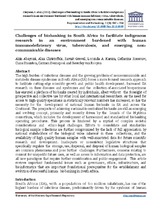Challenges of biobanking in South Africa to facilitate indigenous research in an environment burdened with human immunodeficiency virus, tuberculosis, and emerging non-communicable diseases
Date
2013Author
Abayomi, Akin
Christoffels, Alan
Grewal, Ravnit
Karam, Locunda A.
Rossouw, Catherine
Staunton, Ciara
Swanepoel, Carmen
van Rooyen, Beverley
Metadata
Show full item recordAbstract
The high burden of infectious diseases and the growing problem of noncommunicable and metabolic disease syndromes in South Africa (SA) forces a more focused research approach to facilitate cutting-edge scientific growth and public health development. Increased SA research on these diseases and syndromes and the collection of associated biospecimens has ensured a plethora of biobanks created by individuals, albeit without the foresight of prospective and collective use by other local and international researchers. As the need for access to high-quality specimens in statistically relevant numbers has increased, so has the necessity for the development of national human biobanks in SA and across the Continent. The prospects of achieving sustainable centralized biobanks are still an emerging and evolving concept, primarily and recently driven by the launch of the H3Africa consortium, which includes the development of harmonized and standardized biobanking operating procedures. This process is hindered by a myriad of complex societal considerations and ethico-legal challenges. Efforts to consolidate and standardize biological sample collections are further compromised by the lack of full appreciation by national stakeholders of the biological value inherent in these collections, and the availability of high quality human samples with well-annotated data for future scientific research and development. Inadequate or nonexistent legislative structures that specifically regulate the storage, use, dispersal, and disposal of human biological samples are common phenomena and pose further challenges. Furthermore, concerns relating to consent for unspecific future uses, as well as access to information and data protection, are all new paradigms that require further consideration and public engagement. This article reviews important fundamental issues such as governance, ethics, infrastructure, and bioinformatics that are important foundational prerequisites for the establishment and evolution of successful human biobanking in South Africa.

